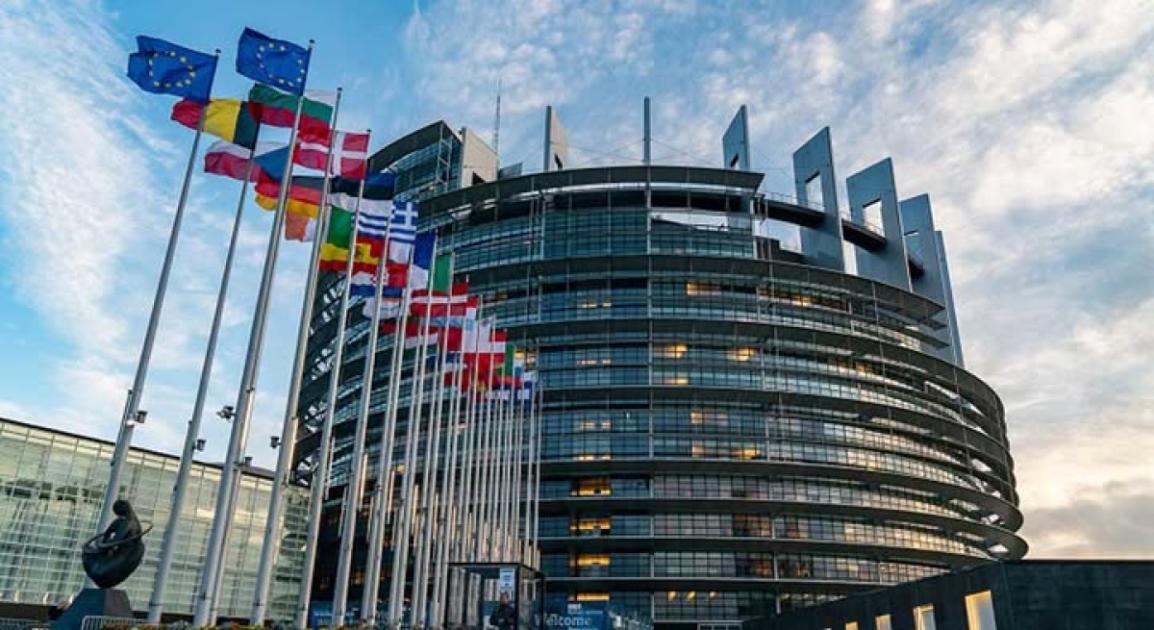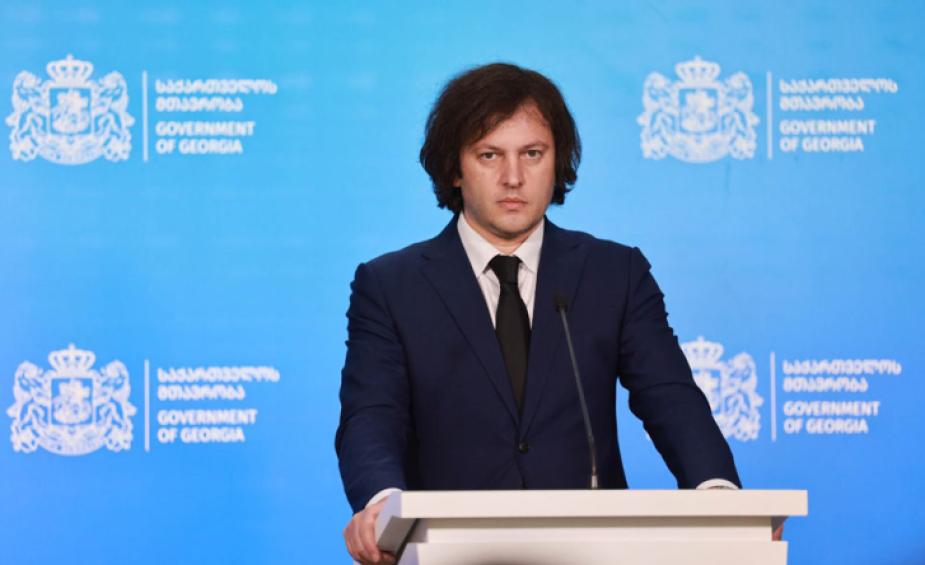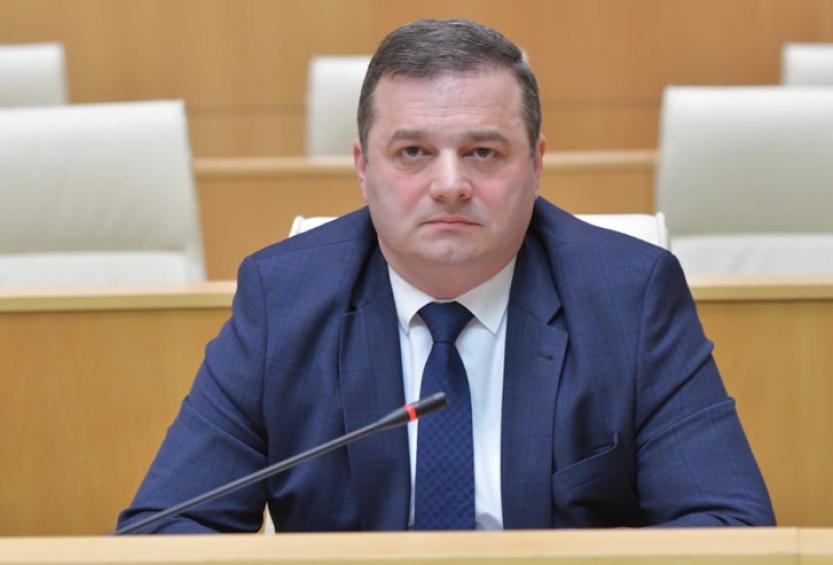
The European Parliament (EP) will hold debates on Georgia today in connection with the European Commission’s 2023 and 2024 reports, followed by a vote on the corresponding resolution.
Below is the draft resolution published on the EP’s website:
The European Parliament:
A. whereas in December 2023, the European Council granted Georgia candidate status on the understanding that the relevant nine steps set out in the Commission recommendation of 8 November 2023 and primarily relating to reforms in the areas of democracy, the rule of law and fundamental rights would be taken;
B. whereas the situation in Georgia has deteriorated significantly since the publication of the 2024 Commission report on the country on 30 October 2024, particularly as a result of the actions of the Georgian Government;
C. whereas Georgia has been experiencing democratic backsliding in recent years and in particular since the parliamentary elections of 26 October 2024, which failed to meet international democratic standards and comply with Georgia’s OSCE commitments, and resulted in an illegitimate parliament composed of only one political party, Georgian Dream; whereas Russia has systematically interfered in democratic processes in Georgia; whereas the fraudulent elections included voter intimidation, vote buying and harassment of election observers;
D. whereas on 28 November 2024, Irakli Kobakhidze announced that Georgia would delay initiating accession talks with the EU and reject its financial assistance until the end of 2028, disregarding the country’s constitutional commitment to European integration and effectively undermining Georgia’s sovereign Euro-Atlantic aspirations, which have the strong support of the Georgian people;
E. whereas concerns over the direction in which the country is heading and the decision to pause the efforts to start accession negotiations sparked large-scale protests across the country, with protesters demanding new, free and fair elections, the return of the country to its European path, an end to political violence and repression, investigations into and accountability for the serious human rights violations committed against protesters by law enforcement agencies, and the release of political prisoners; whereas protests have been taking place every day without interruption since 28 November 2024; whereas pro-EU protests have significantly increased across Georgia in 2025, with tens of thousands of citizens demonstrating against the government’s perceived shift away from EU integration; whereas these self-organised and spontaneous protests involving all segments of Georgian society underscore the Georgian people’s strong commitment to European values and democratic governance;
F. whereas in response to the peaceful protests, the Georgian authorities began an unprecedented violent crackdown on demonstrations, accompanied by the unlawful use of force, torture and other ill-treatment by the de facto authorities; whereas since November 2024, at least 62 people have been criminally charged in connection with their participation in pro-European protests and 54 remain in pre-trial detention; whereas more than 500 people have been detained under administrative procedures, some 300 of whom have reportedly been subjected to torture or other forms of inhuman and degrading treatment and at least 157 of whom have suffered visible signs of serious physical injury;
G. whereas the de facto Georgian Dream authorities systematically subject civil society and independent media to pressure, legal restrictions and physical violence; whereas at least 138 incidents of media freedom violations have been documented in the context of pro-European protests or related events since November 2024, and a total of 174 media professionals have been the target of state repression; whereas at least 30 reporters have suffered repeated violations, including physical assaults, damage to professional equipment, administrative fines, criminal charges and judicial harassment; whereas journalist Mzia Amaglobeli is currently in pre-trial detention on trumped-up charges;
H. whereas the Georgian authorities have been restructuring or eliminating structures within the Georgian civil service responsible for pro-European reforms and dismissing professionals and civil servants en masse, in particular those who have criticised government policies, expressed pro-European views and condemned violence against peaceful demonstrators;
I. whereas the illegitimate Georgian parliament has established the Temporary Parliamentary Investigative Commission on the Activities of the Regime and Political Figures of 2003-2012, which was the period when President Mikheil Saakashvili was at the helm and paving the way for Georgia’s Euro-Atlantic ambitions; whereas this commission is a tool for the further persecution of political opponents, especially leaders of opposition movements; whereas on 22 May 2025, Zurab ‘Girchi’ Japaridze, the leader of the Girchi – More Freedom party and one of the leaders of the Coalition for Change, was arrested for refusing to appear before this politically motivated commission created and controlled by Georgian Dream, whose long-term ambition is to eradicate political opposition in Georgia; whereas on 29 May 2025, Nika Melia, another leader of the Coalition for Change, was arrested one day before he was due to appear in court for refusing to appear before the Temporary Parliamentary Investigative Commission;
J. whereas, in order to maintain and further increase its grip on power, the ruling Georgian Dream party has unilaterally and without consultation adopted changes to the municipal electoral system for the elections to the city councils in October 2025; whereas the Venice Commission of the Council of Europe has recommended repealing these changes and the leaders of the main opposition parties have announced that their parties will not participate in those elections; whereas reforms to the formation process of the Central Election Commission further compromise election integrity, limit citizen participation and restrict the ability of observers and media to effectively monitor the electoral process;
K. whereas despite progress towards a more equal and inclusive society, deep-rooted inequalities and stereotypes persist, resulting in high levels of gender-based violence, severe restrictions for persons with disabilities and violence and harassment against the LGBTI community; whereas due to insecurity at home, many LGBTI people choose to flee the country; whereas Georgia’s legal definition of rape does not comply with the standards set in the Istanbul Convention;
Suspension of Georgia’s EU integration
1. Reiterates its solidarity with the Georgian people and its unwavering support for their legitimate European and Euro-Atlantic aspirations and wish to live in a prosperous and democratic country, as expressed in mass protests that continue despite brutal crackdowns by the authorities; remains ready to assist the Georgian people in achieving these goals; strongly condemns the violent repression, arbitrary and politically motivated detention without sufficient legal grounds and the reported systemic torture of peaceful protesters, civil society actors, political opponents and media representatives; demands that the Georgian authorities refrain from using force, respect the freedoms of assembly and of expression and annul the recently adopted draconian legislation aimed at stifling popular protests, notably through extortionate fines; expresses its particular concern regarding the growing number of political prisoners and reiterates its call for the immediate and unconditional release of all of them; calls for all acts of violence to be effectively and credibly investigated and for those responsible to be held accountable; expresses concern about the lack of independence within the judiciary, with high-placed judges with links to the Georgian Dream overseeing politically motivated court proceedings against peaceful protesters and government critics;
2. Expresses deep regret over the fact that the ruling Georgian Dream party failed to use the historic opportunity granted to Georgia, as a candidate country, to progress on its European integration path, noting that European integration continues to be supported by an overwhelming majority of the population; recalls that candidate status was granted to Georgia with the benefit of the doubt, despite the already concerning trajectory of the Georgian Dream government’s actions, which were increasingly at odds with European values and democratic principles; underlines that Georgia under Georgian Dream’s rule has not moved forward, and has in fact even regressed, on the key provisions of the nine steps indicated by the Commission, despite the authorities’ claims to the contrary; stresses that Georgia’s EU integration process has effectively been suspended as a result of the continued democratic backsliding in the country and the rigged October 2024 parliamentary elections amounting to a clear turning point towards an authoritarian regime, the ensuing illicit capture of the state institutions and democratic safeguards, and the adoption of a series of anti-democratic legislative acts that run counter to the values and principles upon which the EU is founded; concurs with the European Council’s conclusions of 27 June 2024 that a failure to reverse the current course of action jeopardises Georgia’s EU path and urges the Georgian Dream to return to the course of democratic reforms and Euro-Atlantic integration;
3. Deplores the dismissal of approximately 700 civil servants since December 2024 due to their participation in or support for pro-European protests; stresses that such retaliation erodes public trust in democratic institutions, violates freedom of expression and association, and contributes to the deepening authoritarian tendencies of the current regime; calls on the Georgian authorities to abide by labour law standards and to allow civil servants to register a trade union in order to protect them from the unjustified restriction of their labour rights; expresses its concern about the growing politicisation of civil service appointments, and calls for a repeal of the amendments to the Law on Public Service adopted in December 2024 that remove the competition rule for the appointment of civil servants and instead grant direct appointment powers to the heads of public institutions; reiterates that these amendments constitute worrying backsliding from the successful public service reform that was implemented by Georgia under the EU-Georgian Association Agreement and calls for their repeal; 4. Stresses the need for an immediate and comprehensive audit of the EU’s policy towards Georgia given the ongoing democratic backsliding and the increasingly repressive political and legislative environment that constitutes a regression for many of Georgia’s democratic achievements and successful EU reforms, fundamentally weakens democratic institutions and further consolidates power in the hands of the ruling party; calls, in this regard, on the Commission to review the implementation of the EU-Georgia Association Agreement in the light of the blatant breach of Georgia’s obligations regarding the general principles laid down in Article 2, namely respect for democratic principles, human rights and fundamental freedoms; reiterates that non-fulfilment of these obligations may result in the conditional suspension of economic cooperation and the privileges afforded by the Agreement;
5. Deplores the fact that high-level ruling party officials, members of parliament and government-affiliated media regularly spread manipulative narratives, disinformation and conspiracy theories about the EU, its Member States, leaders and politicians, as well as European integration; stresses that the ruling party’s regime continues its purposefully deceitful and ambiguous discourse, fuelling the false belief among parts of the Georgian public that it remains in favour of European integration; regrets the fact that the media and information environment is being suppressed and dominated by TV and media outlets supported by Georgian Dream, which spread false narratives about EU integration, thereby emulating and playing into Russian-inspired propaganda and facilitating polarisation in society;
6. Underlines the responsibility of Bidzina Ivanishvili and other officials and political leaders, including Irakli Kobakhidze, Shalva Papuashvili, Vakhtang Gomelauri, Mayor of Tbilisi and Georgian Dream Secretary General Kakha Kaladze, and the former Georgian Dream chair Irakli Garibashvili, for the deterioration of the political process in Georgia by enabling democratic backsliding resulting in the autocratic consolidation of power and by acting against the country’s constitutional objective of Euro-Atlantic integration; calls, therefore, for immediate and targeted personal sanctions to be imposed against Bidzina Ivanishvili, his family members and his companies and calls for the EU, in cooperation with other jurisdictions, in particular the United Kingdom, to freeze his financial assets; deplores the obstruction by the Hungarian and Slovak Governments of the Council decisions on the imposition of sanctions against individuals responsible for democratic backsliding in Georgia; condemns the unilateral actions by the Hungarian Government seeking to legitimise Georgian Dream;
Continued backsliding on democracy and the rule of law and the autocratic consolidation of power
7. Reiterates its position that the settlement of the current political and constitutional crisis in Georgia can only be achieved by way of new parliamentary elections, which should be held in the next few months in an improved electoral environment, overseen by an independent and impartial election administration and monitored through diligent international and independent domestic observation to guarantee a genuinely fair, free and transparent process that would reflect the true will of the people;
8. Stresses that it does not recognise the self-proclaimed authorities established by the Georgian Dream party following the rigged parliamentary elections of 26 October 2024 and that it considers Georgia to be a state captured by the illegitimate Georgian Dream regime; consequentially rejects any decisions taken by the body that has taken control of the country, such as the rushed adoption of amendments to the Code on Administrative Offences, the Criminal Code and the Law on Assemblies and Manifestations; regrets the fact that the parliament of Georgia is a one-party parliament formed on the basis of fraudulent elections, which is incompatible with a pluralistic parliamentary democracy and the standards expected from an EU candidate country; welcomes the rejection of Georgian Dream’s credentials in the Parliamentary Assembly of the Council of Europe, which resulted in the withdrawal of the Georgian delegation;
9. Deplores the continued attempts by the ruling Georgian Dream party to persecute political opponents, including through their illegal arrest and detention, threats and physical attacks; reiterates its calls for an end to politically motivated hostilities, an improvement to the political environment and the building of trust and cross-party dialogue;
10. Condemns the unlawful prosecution of political opponents by the investigative committee of the de facto Georgian parliament under the leadership of the Georgian Dream party, which disproportionately targets the actions of the government that ended its mandate more than twelve years ago; highlights the political nature of the ‘investigation’, noting that the Georgian Dream party has been in power since 2012 but launched the investigative committee in parallel with its attempts to ban genuine opposition parties; notes with concern the statements by the chair of the investigative committee, Tea Tsulukiani, spreading Russian narratives; strongly condemns the arrest of Zurab ‘Girchi’ Japaridze and Nika Melia, and the threats to arrest other politicians, and considers these individuals to be political prisoners;
11. Expresses deep concern over recent declarations by leaders of the ruling Georgian Dream party indicating their intention to declare opposition parties – primarily the United National Movement – unconstitutional; recalls that the United National Movement played a pivotal role in initiating and advancing Georgia’s European integration process; notes the parallels between the conduct of the Georgian Dream de facto authorities and the current Kremlin regime, which cemented its rule by outlawing opposition parties; condemns the draft amendment to the Organic Law on Political Associations of Citizens and to the Law on the Constitutional Court adopted on 13 May 2025, which would empower the Constitutional Court to effectively and arbitrarily ban all opposition parties;
12. Strongly reiterates its demand for the immediate release of former President Mikheil Saakashvili on humanitarian grounds for the purpose of seeking the necessary medical treatment abroad; emphasises that the Georgian authorities bear full responsibility for his health and well-being and must be held accountable for any harm that befalls him; calls, furthermore, on the Georgian Dream authorities to ensure that Members of the European Parliament are granted unhindered access to Mikheil Saakashvili;
13. Underlines that the policy of non-recognition of the legitimacy of the one-party parliament and the president appointed by it should continue until there is a tangible change in the political course of Georgia and new free and fair parliamentary elections are held; calls for the EU’s and the Member States’ representatives and members of parliament to refrain from meetings with representatives of the regime, starting with the current de facto president; continues to recognise Salome Zourabichvili as the legitimate President of Georgia and representative of the Georgian people; praises her efforts to peacefully steer the country back towards a democratic and European path of development;
14. Points out that the upcoming municipal elections in autumn 2025 present yet another test for the resilience of Georgia’s democracy and political pluralism; calls on the opposition to seize the opportunity presented by these elections to reflect the unity of the Georgian people in favour of democracy and the rule of law, as already demonstrated in the peaceful protests against the manipulation of the parliamentary elections and repression; calls for the municipal elections to be held in an improved electoral environment, overseen by an independent and impartial election administration and monitored through diligent international observation to guarantee a genuinely fair, free and transparent process;
15. Is deeply concerned, in this context, by the further deterioration of the electoral system and the overall democratic environment ahead of the municipal elections, in particular the fast-tracked adoption of new amendments to Georgia’s Organic Law and to the Election Code in December 2024 that undermine the principle of equal suffrage and aim to solidify the ruling party’s dominance at all levels of governance; recalls that these amendments have been criticised by the Venice Commission and calls for them to be repealed; calls on the Vice-President of the Commission / High Representative of the Union for Foreign Affairs and Security Policy and the Member States to consider imposing additional individual sanctions against Georgian officials if the upcoming municipal elections fail to meet the criteria for fair and free elections;
16. Strongly condemns the continuing and deliberate destruction of the environment for Georgia’s vibrant civil society, with the adoption of several pieces of restrictive Russian-style legislation, including on the transparency of foreign influence, threats, and stigmatisation by the authorities; strongly denounces the new legislative initiative that requires the registration of all civil society organisation grants with the government and that obliges foreign donors to obtain executive approval to disburse grants to local organisations; regrets the recent decision by the authorities to freeze the bank accounts of crowdfunding initiatives and campaigns in support of political prisoners and their families; calls on the authorities to immediately cease the intimidation, threats, politically motivated prosecutions and physical assaults against civil society representatives, political leaders, civil activists, journalists and media workers in Georgia; condemns the arbitrary and unjustified refusal of several European journalists’ entry to Georgia;
17. Condemns the recent adoption, without due public consultation, of legislation that enables further political persecution, limits the right of assembly, and further shrinks the space for civil society, independent media and the opposition to operate freely, including the Russian-style foreign agent law, the amendments to the Law on Public Service, the amendments to the Law on Grants, the Foreign Agents Registration Act, as well as new restrictive amendments to the Broadcasting Law; calls for the Georgian authorities to repeal these legislative changes; stresses that Georgian Dream’s political conduct, including its strategic alignment with the Russian Federation and the accelerated adoption of tools characteristic of authoritarian regimes, mirrors such developments within Russia itself;
18. Commends the work of Georgia’s civil society in the past months, providing free legal aid, documenting serious human rights violations and taking the lead on domestic and international litigation to seek justice and accountability against a background of continued attacks, the criminalisation of civic space, and disinformation campaigns against the work of civil society;
19. Stresses the urgent need to support Georgia’s civil society and independent media in the light of the growing repression and the suspension of the activities of the US Agency for International Development (USAID), and therefore asks the Commission to increase financial support and disburse it without any further delay; calls for the EU’s funding mechanisms to be adjusted to take into account the needs that arise in a more hostile and anti-democratic environment and for funds to be reallocated to directly support civil society organisations, independent media and human rights defenders; stresses further, in this regard, that the Member States should be ready to receive and support Georgian civil society organisations and independent media outlets so that they can continue their work in exile;
20. Stresses that beyond Georgian Dream’s rejection of Georgia’s EU integration, it rejects more generally international human rights law and democratic standards, while speedily moving along the negative trajectory previously witnessed in Russia; is deeply concerned, specifically, that this will have further trickle-down effects on the rights and well-being of women, minorities, migrants, persons with disabilities, LGBTI people, people living below the poverty line, and other vulnerable or at-risk groups; strongly condemns the adoption of anti-LGBTI legislation by the Georgian parliament in October 2024, which mirrors authoritarian, Russian-style policies and violates the EU Charter of Fundamental Rights, and calls for it to be repealed; calls for the reinstatement of gender quotas that were abolished by the parliament of Georgia in April 2024; calls on the EU Member States, when assessing asylum applications, to adequately take into account the fact that Georgia now has one of the most repressive anti-LGBTI laws in Europe; is concerned about the lack of protection of ethnic and religious minorities in Georgia;
21. Reiterates that the measures taken by the EU so far in response to the flagrant democratic backsliding and reneging on previous commitments do not reflect the severity of the situation in Georgia and its consequences across the region; regrets the lack of proactive measures taken and the generally limited and delayed reaction by the Council and the Commission; stresses that the absence of unanimity among the Member States should not prevent those willing to take appropriate and effective measures from doing so; calls on the EU’s leadership to urgently rally like-minded Member States to take coordinated action and thereby surmount the political obstacles to adopting EU-wide sanctions;
22. Calls for the EU and its Member States to introduce, on a bilateral and coordinated basis, personal sanctions against key Georgian Dream political leaders, officials and the regime’s enablers in the administration, business, media, justice system, law enforcement agencies and the electoral commission who are responsible for democratic backsliding, electoral fraud, human rights violations and the persecution of political opponents and activists; further calls for sanctions to extend to mid- and lower-level public officials responsible for implementing repressive measures against the regime’s opponents and to maintain them until Georgian democracy is adequately restored; welcomes the imposition of bilateral sanctions by Lithuania, Estonia, Latvia, Czechia, Germany and Poland, as well as by like-minded partners such as the United States, the United Kingdom, Canada and Ukraine, and invites other EU Member States to follow suit; calls for the consideration of further restrictive measures, such as SWIFT cut-off or sectoral sanctions, aimed at cutting off the financial flows and sources of income of the Georgian Dream regime;
23. Welcomes the Council’s decision to suspend visa-free travel for Georgian diplomats and officials as a first step in response to the persistent negative developments in Georgia; reiterates its call on the Commission and the Council to review Georgia’s visa-free status, with the possibility of suspending it if the relevant benchmarks and standards on democratic governance and freedoms are not met because of the ruling party’s actions; stresses that Georgian Dream is fully responsible for any consequences stemming from the possible suspension of the visa-free regime for Georgian citizens; stresses the importance of visa-free travel for Georgian civil society actors, human rights activists and journalists, among others, both for travelling to the EU to inform European actors of developments in Georgia, but also for enabling them to quickly leave the country, as many face political persecution by the authorities;
Alignment on foreign policy matters
24. Deplores the fact that Georgian Dream is undoing decades of progress towards democracy, the rule of law and Euro-Atlantic integration and is alienating its allies, which had supported it throughout the process; regrets that Georgia has made no progress on implementing the EU’s recommendations on foreign, security and defence policy and that the level of Georgia’s alignment with the EU’s common foreign and security policy (CFSP) remains remarkably low, at 49 %, demonstrating its lack of commitment to European integration; emphasises that progress in the EU accession process requires full alignment with the EU’s CFSP, in line with the expectations for all candidate countries; regrets the fact that Georgia does not participate in the EU’s crisis management missions and operations under the common security and defence policy; regrets the fact that misalignment of Georgia’s foreign policy is leading to self-isolation and that Georgian Dream’s repressive regime is worsening the instability in the South Caucasus region and the Black Sea;
25. Notes that Georgia, under the current government, is moving in a direction that puts it at risk of becoming a Russian vassal state like Belarus; regrets the fact that, at a time when the democratic world is standing in strong support of Ukraine against the Russian Federation’s unprovoked war of aggression, the current Georgian authorities are increasingly aligning themselves with Kremlin policies and rhetoric, thereby contributing to historical revisionism; notes that Georgia has not aligned with the vast majority of sanctions against Russia, Belarus and Iran, but has claimed that it has cooperated with the EU to prevent sanctions circumvention; expresses its concern, however, over reports alleging Georgia’s role in facilitating the evasion of EU sanctions against Russia; calls, therefore, on the Commission to conduct a thorough investigation into such allegations;
26. Notes also with concern the recent strategic turn by the Georgian Dream government towards China and its increasing cooperation with Iran; notes the Georgian Dream’s public support for Chinese geostrategic initiatives and strengthened bilateral economic relations, including the award of the Anaklia deep-sea port construction project to a Chinese-led consortium; emphasises that such a move contradicts Georgia’s stated commitment to Euro-Atlantic integration; underscores that the Anaklia project now risks becoming a vehicle for increasing Chinese political, financial and economic leverage in the region, thereby further distancing Georgia from its strategic partners in the West; calls, in this regard, on the Commission and the Member States to review and, if necessary, suspend or redirect funding for regional connectivity projects; expresses serious concern about Georgia’s increased multifaceted cooperation with Teheran, which can lead to Georgia’s further isolation;
27. Warns that Georgia’s ongoing turn towards authoritarianism and increasing alignment with Russia constitutes a growing threat to European security, particularly in view of Georgia’s strategic location and access to the Black Sea, which is critical to Russia projecting power in the region; underlines that the ruling Georgian Dream party’s strategy may be replicated elsewhere as a playbook for hybrid state capture; is concerned about regional repercussions and warns that the credibility of European action in the wider South Caucasus is at stake, especially in anticipation of the forthcoming EU Black Sea strategy;
28. Is deeply concerned about Georgian Dream’s collaboration, rapprochement and ideological convergence with Russia and other authoritarian regimes, despite Russia’s creeping occupation of Georgia’s territory; denounces Georgian Dream’s promotion of and participation in Russian disinformation and manipulation, including the weaponisation of the Russian war of aggression against Ukraine as a propaganda tool, which are at odds with the undiminished and extraordinarily high public support for the country’s Euro-Atlantic integration; regrets the lack of cooperation with the EU in the fight against foreign information manipulation and interference;
29. Reiterates its strongest condemnation of Russia’s ongoing occupation of Georgia’s regions of Abkhazia and South Ossetia and the continued ‘borderisation’ process, which constitutes a violation of Georgia’s sovereignty and territorial integrity; urges the Georgian government to maintain a clear and consistent position on Russian aggression and calls for the EU to remain actively engaged in conflict resolution, human rights monitoring and support for affected communities;
30. Recommends the reinforcement of the EU Monitoring Mission in Georgia (EUMM) with increased resources and a broader mandate to monitor foreign interference and border destabilisation; urges the Member States to ensure adequate funding and personnel for the EUMM to respond to the current political and security crisis;
31. Notes that support from the European Peace Facility, worth EUR 30 million, was rightfully suspended in 2024 in response to the democratic backsliding in Georgia and that no support is planned for 2025; highlights that this suspension will have detrimental consequences on the national stability and security of Georgia; reiterates that any future financial support can only be authorised with the stipulation that the self-declared Georgian regime step down and fair and impartial elections be held;
32. Instructs its President to forward this resolution to the Council, the Vice-President of the Commission / High Representative of the Union for Foreign Affairs and Security Policy, the Commission, the governments and parliaments of the Member States, the Council of Europe, the Organization for Security and Co-operation in Europe, the President of Georgia Salome Zourabichvili and the self-appointed authorities of Georgia.
0
0










